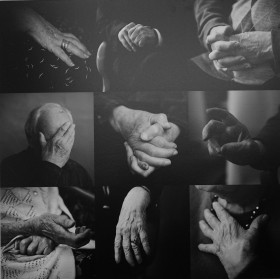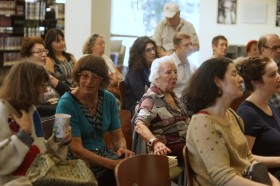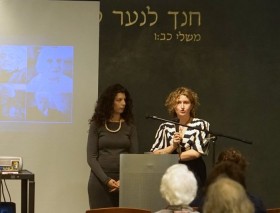Speak Memory Project Comes to San Francisco
It was only a few years before my grandfather’s death that I learned his real name was Isaac. Somehow, I’m not sure when, he changed his name to Simon. It was around that time that I found out he was born in Romania and not in Moldova or Ukraine like I had assumed. He was born speaking Romanian […]
It was only a few years before my grandfather’s death that I learned his real name was Isaac. Somehow, I’m not sure when, he changed his name to Simon. It was around that time that I found out he was born in Romania and not in Moldova or Ukraine like I had assumed. He was born speaking Romanian and only learned Russian later. When I discovered these little details, I realized how much I didn’t know about him and how much he might have to tell. Unfortunately, I didn’t get to hear most of his stories.

Yuliya Levit had a similar experience with her grandfather and realized the need to chronicle the stories of our grandparents, who lived through the most trying and compelling years of the 20th century. So, she started Speak Memory Project and began looking for subjects. Together with Marina Eybelman, they have chronicled stories of love and loss, pogroms and clandestine worship, World War II and the families it tore apart.
The stories they’ve gathered are moving, whether through small details – like a father buying his daughter several pairs of shoes for her to grow into because he knows he won’t be there to watch her grow up – or through major events, like the unthinkable pain of losing family to war, disease, or the ‘’black crows’’ of the KGB.

Each story is unique and provides a rich look into life during the Soviet Union – from shtetls to big cities – and is accompanied by a beautiful black and white photograph of the subject, taken by both Eybelman and Levit.
Levit and Eybelman encourage everyone to take the time to listen to their grandparents’ stories as a way to engage with people who have so much to tell but no one to listen, as well as to learn more about themselves, their history, and of course, their grandparents. In order to do that, they’ve assembled a list of ten tips for a successful interview, so that no story goes untold.
1. Be prepared. Get your recorder and camera ready. We always carry a recorder with us. You never know when a conversation will lead to an interesting story.
2. Prepare questions which interest you, maybe some family stories you want to learn more about, or maybe some particular events the person you are interviewing was a witness to.
3. Set aside enough time for the interview. Our typical interview lasts for about 2–3 hours. Sometimes we have to split it into several shorter interviews. Be ready for that. Allow yourself enough time. Quite often people don’t want to talk because they feel like no one is willing to listen. When they see that you are genuinely interested, and you are there to listen, you are not rushing anywhere, they are much more open to a conversation.
4. Prepare the person you are interviewing. Let them know that you would like to ask them to tell you a story about their life, let them know why it is important to you and set the date and time. Let them know that you are going to be recording the interview. It is not an easy conversation, and it helps for the person you are interviewing to be prepared emotionally and know what they are going to say.

5. In the beginning of the interview, most of the people we are interviewing are giving us a short version of their story, which looks like a resume and lacks any details. Listen to it, let them finish the story. And then start your questions from the very beginning. This story is also important as it gives you some insight, and might lead to interesting questions later on.
6. We start the conversation from the very beginning with questions about childhood and follow the lead of the person you are interviewing. But if they steer too far away from the point of conversation (like start to discuss current politics) gently bring the conversation back .
7. It is not an easy conversation, and any question, no matter how innocent it looks, might be an emotionally loaded question. So be prepared to switch the topic to something else, if you see that conversation is getting too difficult. Move on, and maybe later you can try to ask that question differently.
8. We never bring up war experience ourselves. Only if the person we are interviewing starts talking about it, or indicates that they are open to talking about it.
9. Keep an open mind. It is sometimes very very difficult not to judge. But it is impossible to know what would we do if we happened to be in the same situation, maybe our actions would have been far worse.
10. Do your best to not interrupt. If you have a question, write it down and ask when the person has finished talking. You never know what the person was going to say and might never find out if they forget or lose their train of thought when they were interrupted and answered the question.
The stories they’ve gathered speak for themselves and they are on display until December 13 at the Jewish Community Library in San Francisco. The Speak Memory Project exhibit will be traveling to Limmud FSU West Coast at the end of January and New York in the near future.
Levit and Eybelman are constantly looking for people to interview, so if you know someone with an interesting story, get in touch with them at www.speakmemoryproject.org, via email at info@speakmemoryproject.org, or through their Facebook page at facebook.com/SpeakMemoryProject.
Photos by Igor PORTON
Tatiana Sundeyeva-Orozco has gotten into the terrible habit of thinking too much about everything. She enjoys fantasizing about traveling, compulsively buying literature, laughing at her own puns, and consuming anything (and everything) that can be found in a bakery. She is a graduate of UC Berkeley where she got a degree in English with a minor in Italian. She can be found celebrating awesome female friendships on LadyBromance.com.
By Tatiana Sundeyeva-Orozco





